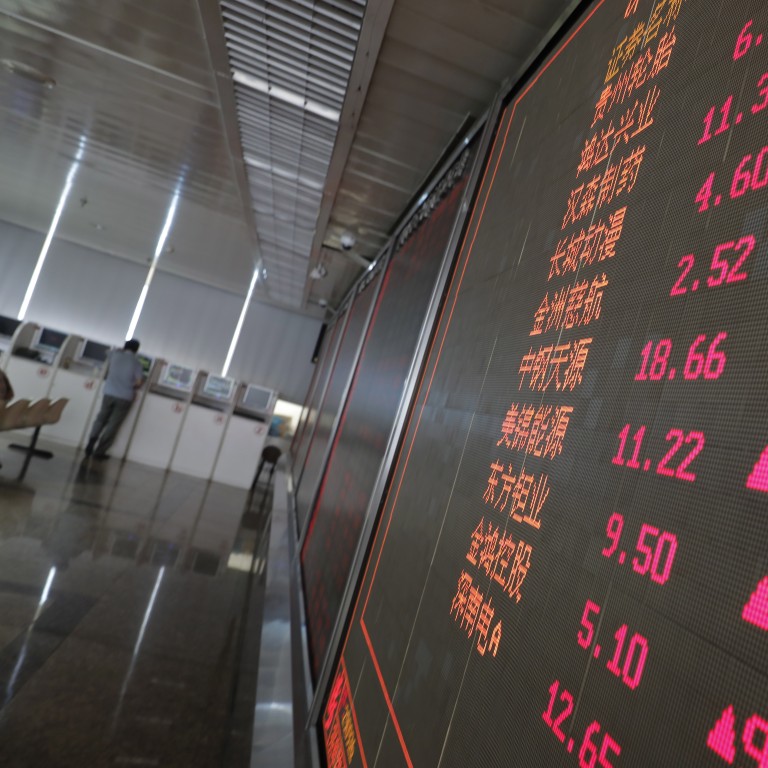
China, Hong Kong shares surge on news of Trump and Xi’s agreement to talk trade at G20
- Trade talk derailment last month led to steep fall in Chinese, Hong Kong markets
- Information technology, electronics and telecommunication stocks shoot up
The Shanghai Composite Index climbed by as much as 2.2 per cent on Wednesday, before trimming some of the gains and closing up 1 per cent at 2917.80. The benchmark rose for the third-straight day on hopes the Trump-Xi meeting will lead to a trade deal.
The CSI 300 Index of large companies traded in Shenzhen and Shanghai closed up 1.3 per cent, and the Shenzhen Composite Index was up 1.5 per cent.
Turnover stood at 504 billion yuan (US$73 billion), up from 321 billion yuan recorded on Tuesday.
In Hong Kong, the Hang Seng Index ended up 2.6 per cent at 28202.14. That marked its third straight day of gains, and its biggest daily gain since November 2 of last year, when it shot up 4.2 per cent.
“The market has suddenly made a big change in its judgment on the trade situation,” said Alan Li, portfolio manager at Atta Capital, a Hong Kong-based investment firm.
Why Trump’s Huawei ban deals a harder blow than his tariffs
The derailment of trade negotiations sparked a steep fall-off in Chinese and Hong Kong markets.
But traders were feeling frisky on the Trump-Xi news, though on the mainland, they backed off bigger morning gains.
“We’re not out of the woods yet,” said Louis Tse Ming-kwong, managing director of brokerage VC Asset Management. “Mainland Chinese investors understand that,” he said.
“They won’t be fooled by two leaders meeting and having perfect agreement on the trade dispute,” he added. “Mainland Chinese investors don’t have strong confidence that this kind of meeting can render a [working] agreement,” he said.
In Shanghai, all sectors ended ahead on Wednesday, with information technology leading gains, up 2.1 per cent, on hopes the Xi-Trump meeting will result in the US backing down from its blacklisting of Huawei and some other Chinese tech companies. Next big gainers were industrials, health care and consumer discretionary, which rose at least 1.5 per cent.
Thirty stocks on the Shanghai benchmark hit or nearly hit the 10 per cent upside limit, including Will Semiconductor and Shanghai Wondertek Software.
Electronic and telecommunications stocks also led the advance in Hong Kong.
Shares of Sunny Optical Technology, which supplies smartphone components to Huawei Technologies – the Chinese telecoms giant targeted by the US – jumped by 10.1 per cent to HK$79.5. That made it the top gainer of the 50 constituent stocks on the Hong Kong benchmark.
ZTE Corp, the telecoms giant forced to suspend production for three months last year because of a temporary US ban, advanced by as much as 11.1 per cent before paring some of the gains to 7.1 per cent in Hong Kong.
Sectors to benefit the most from the positive development in US-China relations include smartphone component makers such as Sunny Optical Technology and AAC Technologies, according to Li. Their share prices and valuation levels have tumbled to a one-year low since the US cracked down on Huawei, a big customer to the component makers.
Huawei’s Ren says he did not expect such a ferocious US attack
Despite the rally, Louis Tse Ming-kwong, managing director of brokerage VC Asset Management, warned traders against thinking the gain was the start of a big roll.
“We’re not out of the woods yet. Mainland Chinese investors understand that,” he said, referring to how Chinese stocks started the morning with big gains but then fell back to only nearly 1 per cent by the close.
“ They won’t be fooled by two leaders meeting and having perfect agreement on the trade dispute,” he added. “Mainland Chinese investors don’t have strong confidence that this kind of meeting can render a [working] agreement,” he said.
Analysts at Chinese brokerage Wanlian Securiteis echoed.
“As trade relations remain uncertain, a correction in the pessimistic expectations [on US-China trade relations] is only likely to prompt a limited rebound in the market,” they wrote in a note on Wednesday.
Wanlian Securities recommended investors to stay cautiously optimistic before results from the G20 meeting. It also recommended investors to look at sectors including domestic semiconductor makers, software and big data developers, as China continues to strengthen its self-reliance in technology.
Gold producers bucked the upward trend and trended lower as risk appetite came back to the market following Trump and Xi’s phone call.
Chifeng Jilong Gold declined 2.4 per cent, against the 1 per cent gain in the Shanghai Composite Index. Gansu Ronghua Industry Group lost 2.4 per cent, and Eastern Gold Jade shed 1.5 per cent.
Previously, gold miners bucked the overall market decline and advanced since May. Chifeng Jilong Gold has climbed 34 per cent since the beginning of May, while the Shanghai benchmark recorded a loss of 5 per cent during the period.


